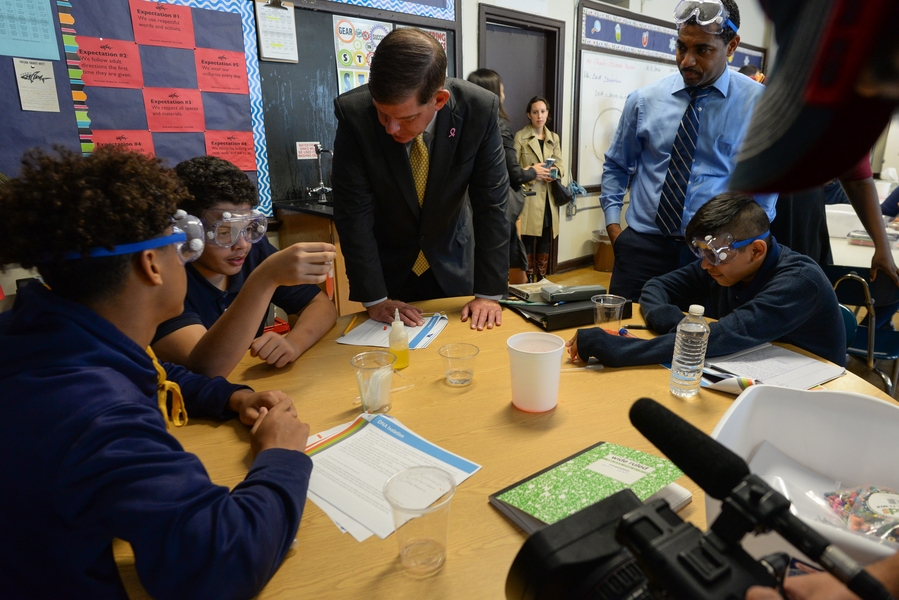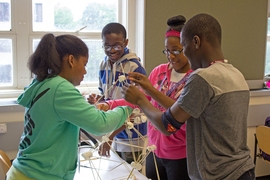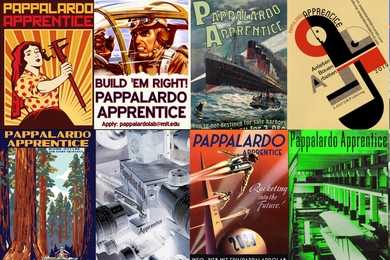Boston STEM Week is here, and MIT is right in the middle of it. The first-of-its-kind, immersive learning experience is underway in sixth, seventh, and eighth grades in Boston Public Schools. From October 3rd to 7th, students are turning into scientists and engineers, classrooms are transforming into learning labs, and regularly scheduled classes are being replaced by innovative science, technology, engineering, and math (STEM) curricula developed by i2 Learning in collaboration with MIT, MathWorks, and other organizations.
Boston STEM Week introduces the engineering design process to more than 6,500 students across 36 Boston middle schools. The focus is on building 21st-century skills in a proven way that engages students in science and engineering practices, such as analyzing data, problem solving, and communicating information. Students and teachers work in teams to solve real-world challenges in settings that encourage hands-on experimentation, critical thinking and collaboration. The goal is to provide an opportunity for all students to gain confidence in these important fields — and perhaps inspire them to pursue a future in STEM.
Curricula developed by MIT
MIT collaborated closely on curricula for three of the six courses offered during Boston STEM Week:
- Building an Interactive, Friendly Monster: Developed by the MIT Media Lab, this course explores the fundamentals of electronics and programming. Using a small computer, conductive thread and some simple programming, students combine sewing and circuitry to create an interactive stuffed monster that lights up, makes noise, and responds to touch.
- Digital Game Design: Using Scratch, the popular programming language developed by MIT Media Lab’s Lifelong Kindergarten group, students learn to create an original video game with custom graphics, sound effects, and music. Students are immersed in the fundamentals of computer programming as they build a game from initial concept, test it with player feedback, and share it with peers.
- Kinetic Sculpture: Developed by the MIT Edgerton Center, this course introduces key concepts and skills like balance, gravity, force, gearing, energy sources and design-oriented thinking. Students examine the moving sculpture work of Alexander Calder, George Rhodes, Anne Lilly, and Arthur Ganson, and use the principles they learn as the basis for their own large-scale, chain-reaction creations.
“Kinetic Sculpture is one of the most engaging courses we’ve developed for i2, and it’s seen great success for students, teachers and parents,” says Robert Vieth, K-12 STEM outreach coordinator for the MIT Edgerton Center. “By combining the core concepts of STEM with art, and a lot of physics principles too, the kids learn that it’s okay to have fun while learning about science and engineering — and that’s it’s okay to fail because that’s the first step to success.”
“MIT’s commitment to hands-on learning is infectious. It has been inspiring to collaborate with them to bring ‘mens et manus’ to Boston’s middle school children,” adds Ethan Berman, i2 Learning founder, referring to MIT's motto of "mind and hand."
A long tradition of innovation in STEM education
While MIT, through the Edgerton Center and Media Lab, has collaborated with i2 Learning on curriculum and content development for several years, Boston STEM Week will serve to both grow that relationship and further the university’s mission to bring MIT’s unique hands-on and minds-on learning approach to younger students. Providing engaging, dynamic STEM curriculum at scale is a central aim of MIT’s pK-12 Action Group, a cross-Institute collaboration of over 125 pre-K-12 outreach programs on campus. The scope of Boston STEM Week — reaching thousands of students and hundreds of teachers across 36 urban schools in just five days — is unprecedented.
“What I find so extraordinary about what Boston STEM Week is doing is that we are inspiring curiosity in young minds, a state that is fundamental to good learning,” says Sanjay Sarma, vice president for open learning and head of the MIT Office of Digital Learning. “Boston STEM Week provides an opportunity for delivering MIT’s curriculum at scale that we hope will inspire a next generation of future engineers, scientists, and innovators.”
Encouraging more STEM in schools
All teachers in the participating middle schools — STEM and non-STEM alike — took part in professional education workshops over the summer to prepare for this week. Professional development is an important goal for the pK-12 Action Group as well, with the hope that by helping non-STEM teachers build confidence with engineering projects, more STEM activities will be integrated into school curriculum beyond this week.
In fact, that’s one reason the pK-12 Action Group is sending volunteers to Boston STEM Week. The volunteers are helping teachers run the projects while also taking time to speak to students about STEM careers — and the bright futures these students have ahead of them.










